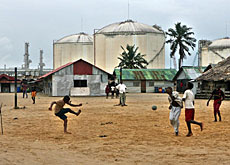Swiss respond to Abacha funds allegation

The Swiss foreign ministry says it has done all it can to ensure that funds stolen by the late Nigerian dictator Sani Abacha were used properly in his homeland.
The authorities were responding to allegations that $200 million (SFr240 million) of $700 million handed back to Nigeria had been misappropriated.
The Basler Zeitung newspaper wrote on Tuesday that a “reliable Swiss source” claimed that the funds had vanished.
Andreas Missbach of the Berne Declaration, a Swiss non-governmental organisation, backed up this allegation, saying that it was “realistic” that such a sum might have been misappropriated. He added that investigations by Nigerian NGOs had shown that the restitution had not gone as planned.
The Basler Zeitung said that the World Bank, supposed to oversee the return of the Abacha funds, had prepared a report containing all the details of the affair, but had yet to release it.
The Berne Declaration said it was “concerned” that the report had not been made public since it probably contained more information about this affair, especially figures. Missbach said he reckoned the document might prove to be embarrassing for Switzerland or Nigeria.
The foreign ministry claimed the report’s release was planned for the end of the year and that it would not comment its contents until then. The Nigerian embassy in Bern refused to respond for the time being.
For the foreign ministry, Switzerland has fulfilled its “moral duty” in handing back the Abacha funds. Its aim had been to find a procedure with the Nigerians that would ensure the money was returned in a transparent fashion.
Plundered
Abacha and his associates are believed to have plundered more than $2.2 billion from state coffers in Nigeria. About $700 million was frozen in Switzerland in 1999, shortly after the dictator’s death from an apparent heart attack.
Despite attempts by Abacha’s family and associates to have the funds handed over to them, the Swiss courts ruled that the money should be returned to the Nigerian government.
Switzerland and Nigeria signed an agreement in September 2005, stating the funds must go to health and education projects, as well as infrastructure development.
swissinfo with agencies
Money laundering involves concealing the origins of money earned through criminal activities and releasing it unnoticed into legitimate business activities.
It is most commonly associated with drug trafficking, but not exclusively.
The Swiss Money Laundering Act obliges all financial intermediaries to identify all clients and to establish the beneficial owners of the assets.
They must also report any suspicion of money laundering to the authorities and freeze related assets.

In compliance with the JTI standards
More: SWI swissinfo.ch certified by the Journalism Trust Initiative










You can find an overview of ongoing debates with our journalists here . Please join us!
If you want to start a conversation about a topic raised in this article or want to report factual errors, email us at english@swissinfo.ch.